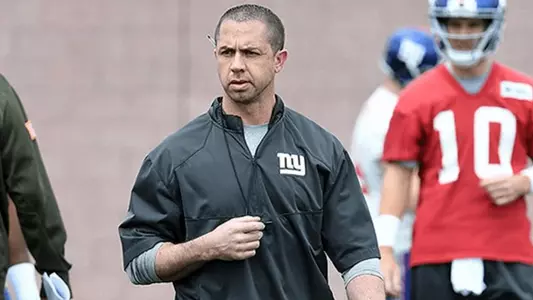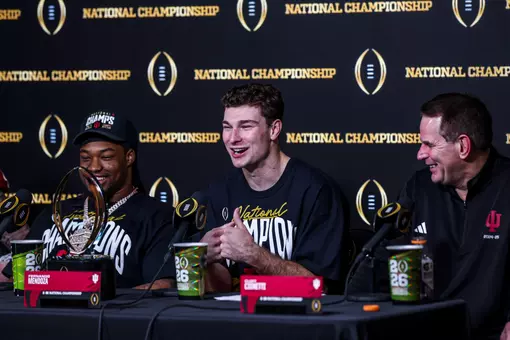Indiana University Athletics

Aaron Wellman Zoom Press Conference & Transcript
9/2/2020 12:29:00 PM | Football
Below is a partial transcript of a Zoom press conference with Senior Assistant Athletic Director for Football Performance Aaron Wellman on Wednesday, Sept. 2.
Senior Assistant Athletic Director for Football Performance Aaron Wellman
Q. On dealing with the mental aspect of training…
WELLMAN: Like any other college player, they love the game. When you take that away from anyone, it is a tough pill to swallow. Our guys had a chance to get away when that announcement came down for a little bit. We were still open in the weight room and certainly here to serve anyone that came in, but they had a chance to get away and I think that helped to get away mentally to process the season. We have a resilient bunch of guys, a great group of guys and whenever adversity hits, opportunity arises. The opportunity for us is to take this time, like everyone we missed a lot of time and missed a lot of time to develop the physical qualities that underpin your ability to play the game of football and be successful in the game from a performance perspective. This gives us time and the opportunity, for the next eight weeks, to really start training and regain some of that lost time, if you will. We are looking to make a lot of progress in our strength, our speed, our explosive power and really lock in on some body composition changes we need to be making. We look at it, I think the team looks at it, as a great opportunity. Certainly, would they much rather be playing the game? Absolutely. But it is a great opportunity for us to grow as a team and to really hone in on where our deficiencies lie and correct those things in the next eight weeks.
Q. On the schedule in the weight room…
WELLMAN: I think that in a 'normal' year this would feel like a second offseason. For me, just getting here in March and not really having an offseason, it just feels like an offseason with a flipped calendar. Right now, obviously, our guys are in class and we are training four days a week. We go Monday, Tuesday, Thursday and Friday. We lift, we run and we do speed improvement work. The focus for now, look the game was taken away from them for now and we have the opportunity to become faster, to become a little bit stronger. Typically, we have something looming. Spring ball is looming and we have to get mentally and physically prepared for it, or the season is looming. Right now, we are kind of in this period where the focus is that we do not know what is looming. What we do know is that the focus right now is to see how strong we can get, see how fast we can get and make improvements on all of these physical qualities that a lot of guys, for no better reason than they were not able to because they could not train the way they wanted to, missed out on these last four or five months. I think our guys intellectually understand the need for it, while at the same time were disappointed that they are not playing football at this time.
Q. On the freshmen development…
WELLMAN: Our freshman got here in late June or in the middle of July. We have not had a great opportunity to work with them. We had some summer conditioning, then we started camp, camp was obviously postponed and halted abruptly, and now we have just started back training on Monday. We have two days under our belts with today as a recovery day for our players before we really go back to some hard work on Thursday and Friday. I will say this, physically it is almost too early to tell how they are responding. We individualize so much of our program, so we consistently monitor not only the athlete's deficiencies but their response to the training loads that we give them. It is a little early to tell physically, but what I can tell you is that I love the attitude. Freshmen, sophomores, juniors all the way to the seniors, the attitude they bring to work every day, their work ethic, how hard they train, they show up on time and they bring great energy. To kick off the fall season in an unconventional way, with just training only, I have been very pleased this week with the attitude and the effort they have shown so far.
Q. On managing playing two seasons in a shortened schedule…
WELLMAN: I do not know that we have a really good, sound answer to that. So much of it depends on the individual. We talk about in training building up these chronic loads, these chronic workloads. Running and training over the course of 8-10 weeks, you build up this chronic resiliency. One thing that we know is that we cannot rush physiology, so just because we say that the season is four weeks away and we just started training … four weeks is probably not enough, or six weeks or whatever it is, that is just an example. We cannot rush physiology. We need to develop some chronic training and right now the best training program we can be on is one that is consistent and one that we can consistently complete on a weekly basis to start building these loads with our players with uninterrupted training. That might be six weeks for one guy and eight weeks for another guy to get them ready for the season. Playing an exorbitant number of competitions within a calendar year that the athlete in unaccustomed to is problematic on several levels. Particularly, because we have not had the training on a consistent basis to prepare for those demands. We, as performance coaches, always look at what the demands are for the season and when those demands begin. So, if that is August 1, we work backwards these 10 weeks to prepare for August 1. Right now, and I said it before, we are in this time where we do not have a clear understanding for what we are preparing for, nor do we have a clear understanding of the loads these players are going to encounter or how many weeks they will encounter and how long between the kickoff of the 2021 season and the end of the 2020 season. I think this whole time from July until now is that we need to work with the information we have and put together the absolute best training program. We have to be flexible and we have to be willing to adjust. I think the team that does that the best will have their athletes in the best physical state and have the biggest opportunity to mitigate those injuries that are associated with high training loads, frequent competitions and a shorter calendar year.
Q. On the timing of building a plan…
WELLMAN: Obviously, the sooner, the better. If we know that we have 2-3 months to prepare, the training program looks vastly different than if they say we are playing in four weeks. That is a whole different ballgame. We take a long-term approach. We try to monitor every yard our players run, the volume of the lifting sessions and the intensity of the lifting sessions on an individual basis with 120 guys. We try to do what is absolutely best for each individual and that is tough to do if we do not have a true end point, if we do not have a true date or how long we have to build to. Certainly, what we do not want to do is overload our players early. The biggest risk of soft tissue injury, the two biggest risk factors are previous injury, which we have a hard time controlling after it has happened, but also is the large, acute increase in training loads. I will give you an example. If they say it's three weeks away, all of us are going to feel a sense of responsibility to increase these training loads and these demands to get them ready for that. There are problems with that. The sooner we know the start date, and I do not know anything that you do not know, we are operating day-to-day, but the sooner we know the clear-cut guidelines on the calendar, the better decisions we are going to be able to make as coaches. The last thing I want to do at this particular time is overload our players too much and run into problems one or two weeks from now.
Senior Assistant Athletic Director for Football Performance Aaron Wellman
Q. On dealing with the mental aspect of training…
WELLMAN: Like any other college player, they love the game. When you take that away from anyone, it is a tough pill to swallow. Our guys had a chance to get away when that announcement came down for a little bit. We were still open in the weight room and certainly here to serve anyone that came in, but they had a chance to get away and I think that helped to get away mentally to process the season. We have a resilient bunch of guys, a great group of guys and whenever adversity hits, opportunity arises. The opportunity for us is to take this time, like everyone we missed a lot of time and missed a lot of time to develop the physical qualities that underpin your ability to play the game of football and be successful in the game from a performance perspective. This gives us time and the opportunity, for the next eight weeks, to really start training and regain some of that lost time, if you will. We are looking to make a lot of progress in our strength, our speed, our explosive power and really lock in on some body composition changes we need to be making. We look at it, I think the team looks at it, as a great opportunity. Certainly, would they much rather be playing the game? Absolutely. But it is a great opportunity for us to grow as a team and to really hone in on where our deficiencies lie and correct those things in the next eight weeks.
Q. On the schedule in the weight room…
WELLMAN: I think that in a 'normal' year this would feel like a second offseason. For me, just getting here in March and not really having an offseason, it just feels like an offseason with a flipped calendar. Right now, obviously, our guys are in class and we are training four days a week. We go Monday, Tuesday, Thursday and Friday. We lift, we run and we do speed improvement work. The focus for now, look the game was taken away from them for now and we have the opportunity to become faster, to become a little bit stronger. Typically, we have something looming. Spring ball is looming and we have to get mentally and physically prepared for it, or the season is looming. Right now, we are kind of in this period where the focus is that we do not know what is looming. What we do know is that the focus right now is to see how strong we can get, see how fast we can get and make improvements on all of these physical qualities that a lot of guys, for no better reason than they were not able to because they could not train the way they wanted to, missed out on these last four or five months. I think our guys intellectually understand the need for it, while at the same time were disappointed that they are not playing football at this time.
Q. On the freshmen development…
WELLMAN: Our freshman got here in late June or in the middle of July. We have not had a great opportunity to work with them. We had some summer conditioning, then we started camp, camp was obviously postponed and halted abruptly, and now we have just started back training on Monday. We have two days under our belts with today as a recovery day for our players before we really go back to some hard work on Thursday and Friday. I will say this, physically it is almost too early to tell how they are responding. We individualize so much of our program, so we consistently monitor not only the athlete's deficiencies but their response to the training loads that we give them. It is a little early to tell physically, but what I can tell you is that I love the attitude. Freshmen, sophomores, juniors all the way to the seniors, the attitude they bring to work every day, their work ethic, how hard they train, they show up on time and they bring great energy. To kick off the fall season in an unconventional way, with just training only, I have been very pleased this week with the attitude and the effort they have shown so far.
Q. On managing playing two seasons in a shortened schedule…
WELLMAN: I do not know that we have a really good, sound answer to that. So much of it depends on the individual. We talk about in training building up these chronic loads, these chronic workloads. Running and training over the course of 8-10 weeks, you build up this chronic resiliency. One thing that we know is that we cannot rush physiology, so just because we say that the season is four weeks away and we just started training … four weeks is probably not enough, or six weeks or whatever it is, that is just an example. We cannot rush physiology. We need to develop some chronic training and right now the best training program we can be on is one that is consistent and one that we can consistently complete on a weekly basis to start building these loads with our players with uninterrupted training. That might be six weeks for one guy and eight weeks for another guy to get them ready for the season. Playing an exorbitant number of competitions within a calendar year that the athlete in unaccustomed to is problematic on several levels. Particularly, because we have not had the training on a consistent basis to prepare for those demands. We, as performance coaches, always look at what the demands are for the season and when those demands begin. So, if that is August 1, we work backwards these 10 weeks to prepare for August 1. Right now, and I said it before, we are in this time where we do not have a clear understanding for what we are preparing for, nor do we have a clear understanding of the loads these players are going to encounter or how many weeks they will encounter and how long between the kickoff of the 2021 season and the end of the 2020 season. I think this whole time from July until now is that we need to work with the information we have and put together the absolute best training program. We have to be flexible and we have to be willing to adjust. I think the team that does that the best will have their athletes in the best physical state and have the biggest opportunity to mitigate those injuries that are associated with high training loads, frequent competitions and a shorter calendar year.
Q. On the timing of building a plan…
WELLMAN: Obviously, the sooner, the better. If we know that we have 2-3 months to prepare, the training program looks vastly different than if they say we are playing in four weeks. That is a whole different ballgame. We take a long-term approach. We try to monitor every yard our players run, the volume of the lifting sessions and the intensity of the lifting sessions on an individual basis with 120 guys. We try to do what is absolutely best for each individual and that is tough to do if we do not have a true end point, if we do not have a true date or how long we have to build to. Certainly, what we do not want to do is overload our players early. The biggest risk of soft tissue injury, the two biggest risk factors are previous injury, which we have a hard time controlling after it has happened, but also is the large, acute increase in training loads. I will give you an example. If they say it's three weeks away, all of us are going to feel a sense of responsibility to increase these training loads and these demands to get them ready for that. There are problems with that. The sooner we know the start date, and I do not know anything that you do not know, we are operating day-to-day, but the sooner we know the clear-cut guidelines on the calendar, the better decisions we are going to be able to make as coaches. The last thing I want to do at this particular time is overload our players too much and run into problems one or two weeks from now.
FB: Curt Cignetti Media Availability (1/17/26)
Saturday, January 17
FB: Curt Cignetti Media Availability (1/16/26)
Friday, January 16
FB: CFP National Championship Game - Student-Athlete Press Conference
Tuesday, January 13
FB: Curt Cignetti Media Availability (1/12/26)
Monday, January 12



